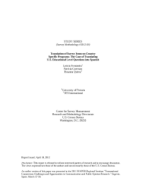
An official website of the United States government
Here’s how you know
Official websites use .gov
A .gov website belongs to an official government organization in the United States.
Secure .gov websites use HTTPS
A lock (
) or https:// means you’ve safely connected to the .gov website. Share sensitive information only on official, secure websites.
-
//
- Census.gov /
- Library /
- Census Working Papers /
- Translation of Survey Items on Country Specific Programs
Translation of Survey Items on Country Specific Programs: The Case of Translating U.S. Educational Level Questions into Spanish
Translation of Survey Items on Country Specific Programs: The Case of Translating U.S. Educational Level Questions into Spanish
Abstract
Various studies have shown the difficulty of translating concepts related to country-specific programs for use in surveys. Questions about educational attainment are an example of a concept that is very difficult to translate for use with respondents from different national origins. This is particularly the case for Spanish-speaking respondents in the United States, who come from a variety of different countries where educational systems are different not only from the U.S. system but from each other as well. This paper presents results from the cognitive testing of the Spanish translation of educational level questions in the U.S. Census Bureau’s American Community Survey (ACS). Two iterative rounds of cognitive testing were conducted on a series of educational level questions with 46 Spanish-speaking respondents from 11 different countries. We found that Spanish speakers interpreted many of the educational level categories differently from what was intended. For example, Mexican-origin respondents interpreted “escuela secundaria,” the original translation used for “high school,” to correspond to nine years of schooling, while in the U.S. completing high school corresponds to 12 years of schooling. Similarly, while the translation for “bachelor’s degree” or “bachiller universitario,” was interpreted appropriately by Puerto Rican Spanish speakers, this was not the case among respondents from Argentina, Mexico, Colombia and Nicaragua. In these Latin American countries the term “bachillerato” is used to describe either junior high school or high school. Both of these translations could result in upward biases in reports of immigrant educational levels since both misinterpretations involve respondents reporting lower levels of education as higher ones. We discuss various approaches taken to deal with the comprehension differences and the extent to which these were successful. The paper concludes with a discussion of implications for the translation and testing of educational levels and other country specific programs, and provides recommendations for future research.
Others in Series
Working Paper
Working Paper
Working Paper
Share
Related Information
Some content on this site is available in several different electronic formats. Some of the files may require a plug-in or additional software to view.
 Yes
Yes
 No
NoComments or suggestions?


Top

